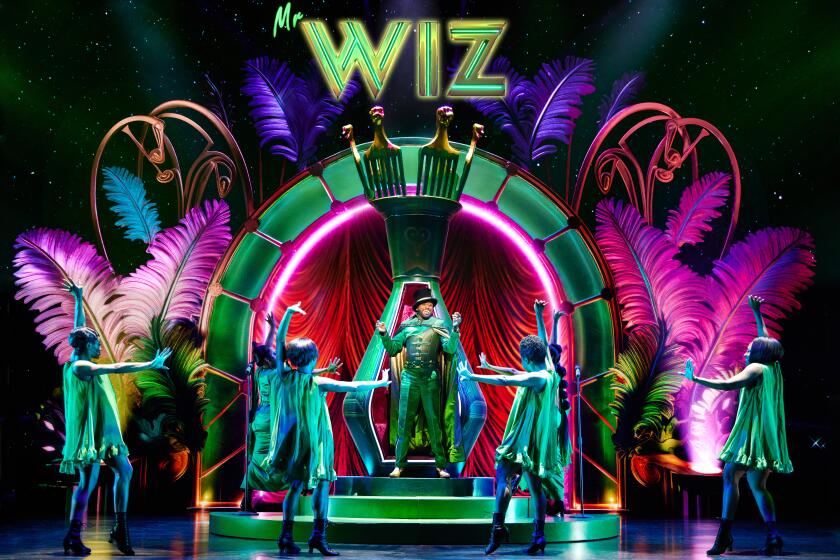‘The Wiz’ revival wobbles more than eases down the road to Broadway
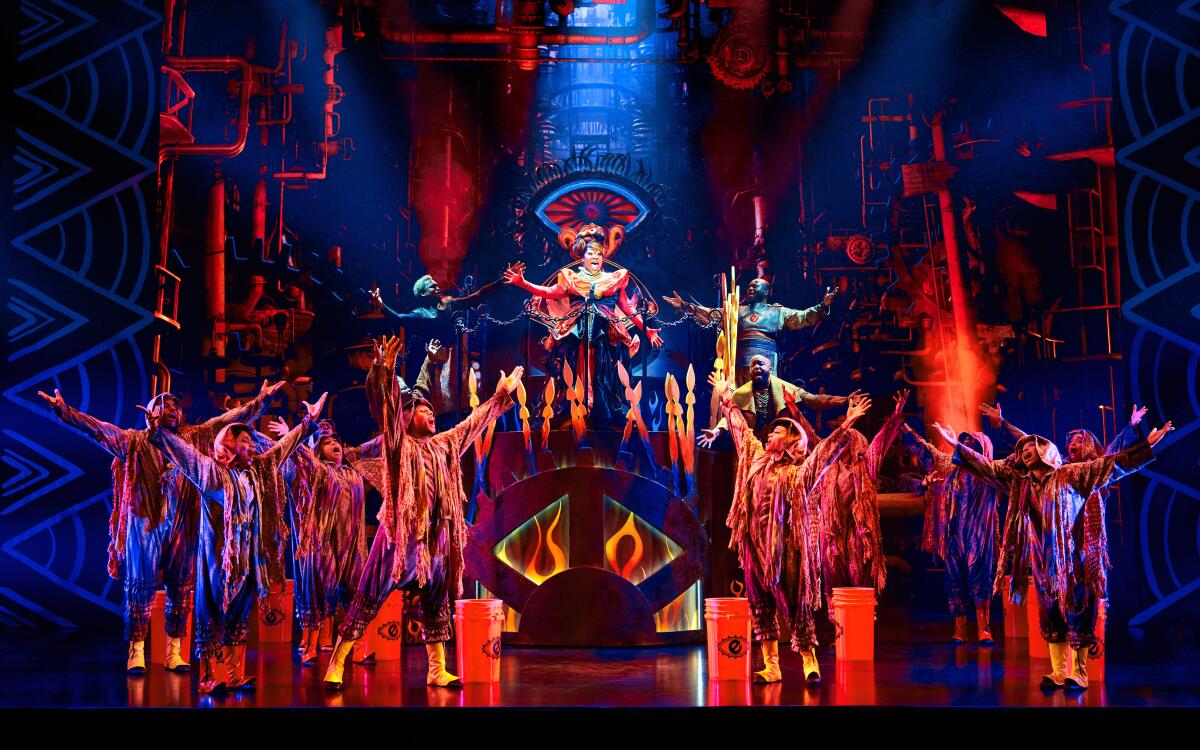
- Share via
When “The Wiz” burst onto the scene in a puff of smoke in 1975, the show became a Broadway sensation, launching the R&B career of a young Stephanie Mills, who played Dorothy, and picking up a slew of Tony Awards, including best musical.
The production, directed by Geoffrey Holder (who won a Tony not only for his direction but also for his costume design), ran for four years. This Black musical adaptation of L. Frank Baum’s classic tale “The Wizard of Oz” became a landmark of Black culture after the release of the 1978 Sidney Lumet film, starring Diana Ross as Dorothy, Michael Jackson as the Scarecrow and Richard Pryor as the Wiz.
The show, which features a book by William F. Brown and a score by Charlie Smalls that includes such R&B hits as “Ease on Down the Road” and “Home,” was revived only once on Broadway, but the magic had already dried up. That 1984 production, directed by Holder and headlined by Mills, lasted only a couple of weeks.
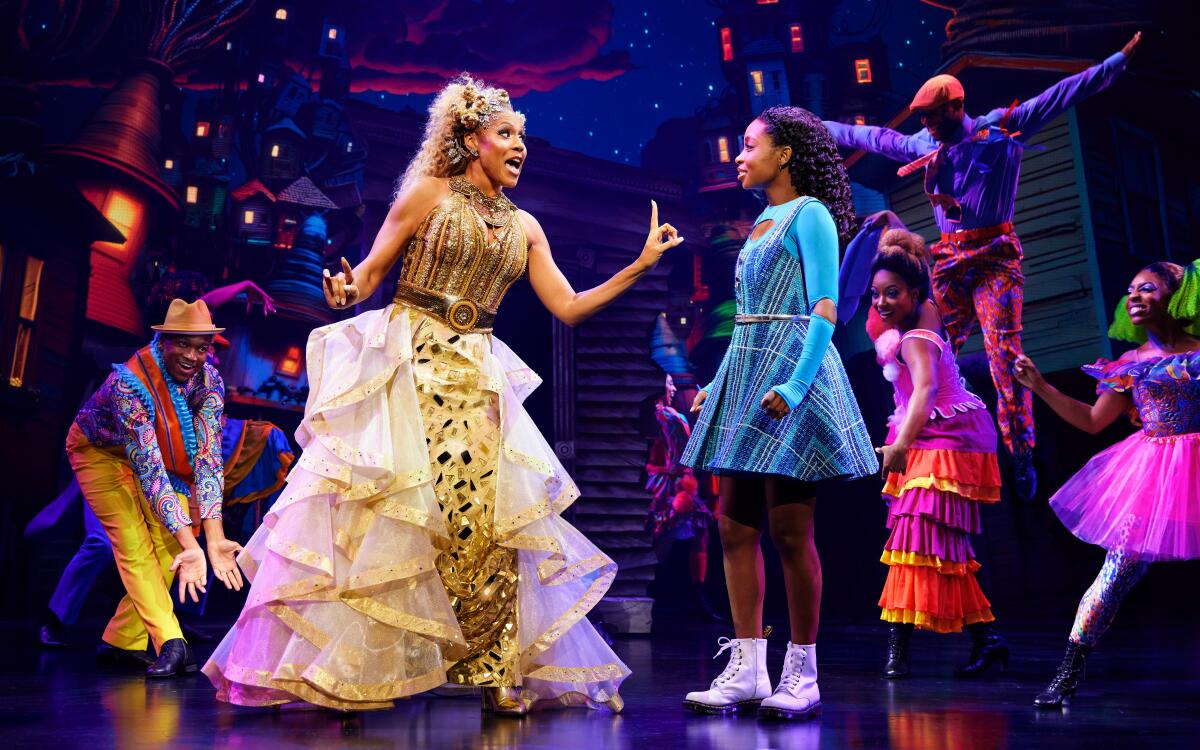
In his New York Times review, Frank Rich questioned the revival’s timing so soon after the film version had aired on national television. But the failure of this “tacky touring production” was apparently widespread. Rich criticized the unimaginative set design, in which “Emerald City looks like a honeymoon suite at a Las Vegas hotel,” and said that the cast contained “not a single performer who can act.”
“It’s depressing,” Rich continued in his trademark straight-shooting way, “to watch a once-fervent expression of black self-respect and talent be spilled on the stage as if it were a trunkload of marked-down, damaged goods.”
I almost tremble to think what Rich would say about the new touring production that had its official opening on Wednesday at the Hollywood Pantages Theatre — the last stop before its Broadway engagement this spring.
The revival’s tacky side can’t be glossed over. The built-to-travel scenic design by Hannah Beachler has some set pieces that look like misshapen items I might have assembled, substituting glue for screws. Projection designer Daniel Brodie conjures enchantment with an impish wink, but visually the show is nothing to look at.
A chorus of dancers is employed to substitute for special effects. When the tornado hits Kansas, this ensemble starts spinning around sinisterly in funereal disco costumes that might have been a hit on the long-forgotten variety television program “Dance Fever.” JaQuel Knight’s choreography has moments of concentrated verve, but when the Ozians, as these over-the-rainbow denizens are known, are called to distract from the scenic deficit with their twirling, the effect is motley and unfocused.
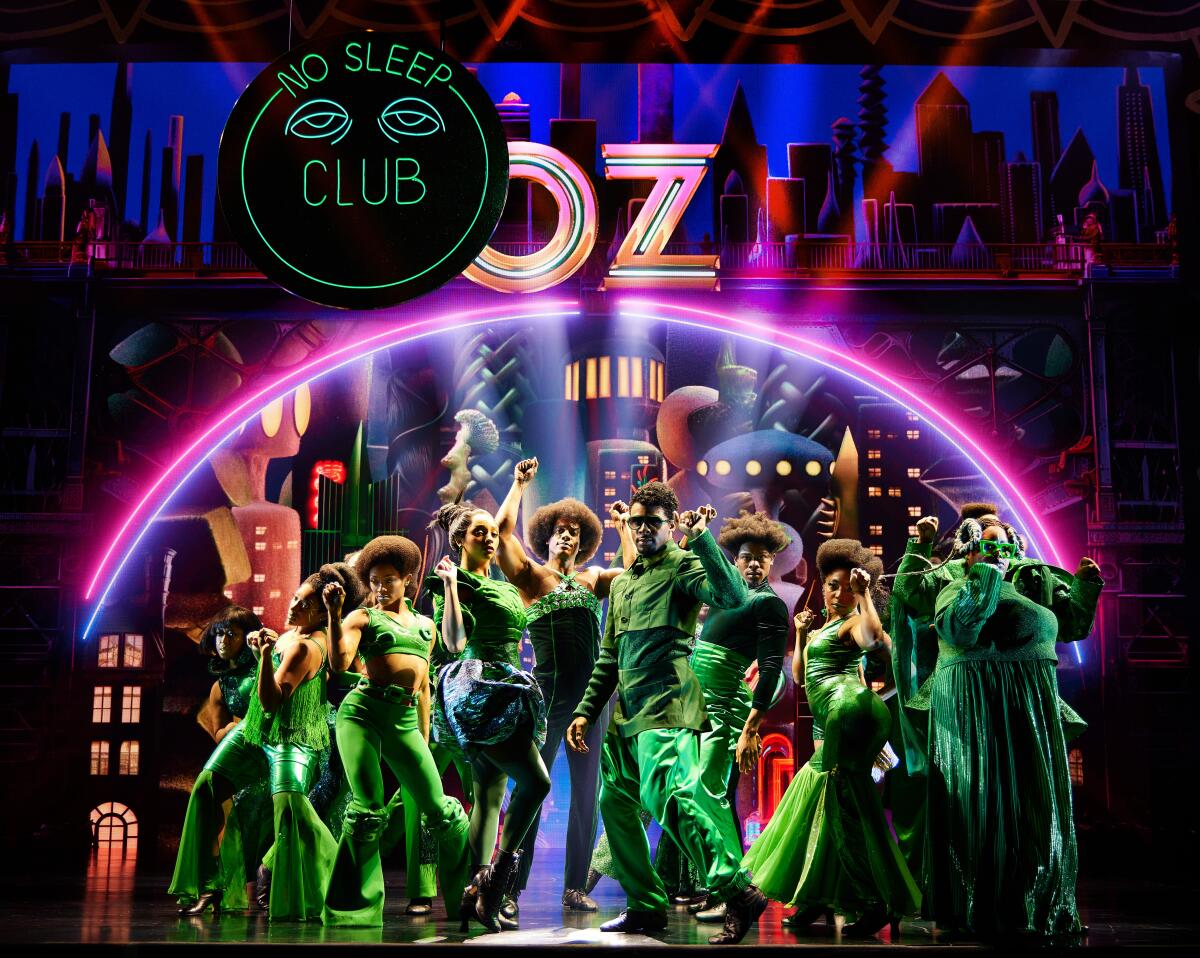
Subtlety is not a prevailing virtue, particularly when comedy and villainy collide. Melody A. Betts is affectingly human as Aunt Em, bringing out the gorgeous emotional color of her number “The Feeling We Once Had,” which she sings to restore Dorothy‘s spirit after a run-in with school bullies. But when Betts plays Evillene, the Wicked Witch of the West, she turns into a Saturday morning children’s TV baddie. The performance is so scenery-chewing that Tyler Perry might even object.
Aglow with radiance, Nichelle Lewis makes a sweetly sad yet still spirited Dorothy. But her greatest contribution to the role is a voice that can sweep the heavens. She commands the stage in song, but she’s too gracious to hog the spotlight. She connects with her fellow cast members, taking genuine delight when it’s their turn to soar.
The alliance Dorothy forms with Scarecrow (Avery Wilson), Tinman (Phillip Johnson Richardson) and Lion (Kyle Ramar Freeman) is the source of the production’s charm and vitality. Friendship goes a long way toward exonerating the production of its shameless indulgences.
Wilson gives Scarecrow a country bumpkin puckishness. The character can’t wait to show the world what he’s got — and Wilson has vocal talent and slapstick skill to spare.
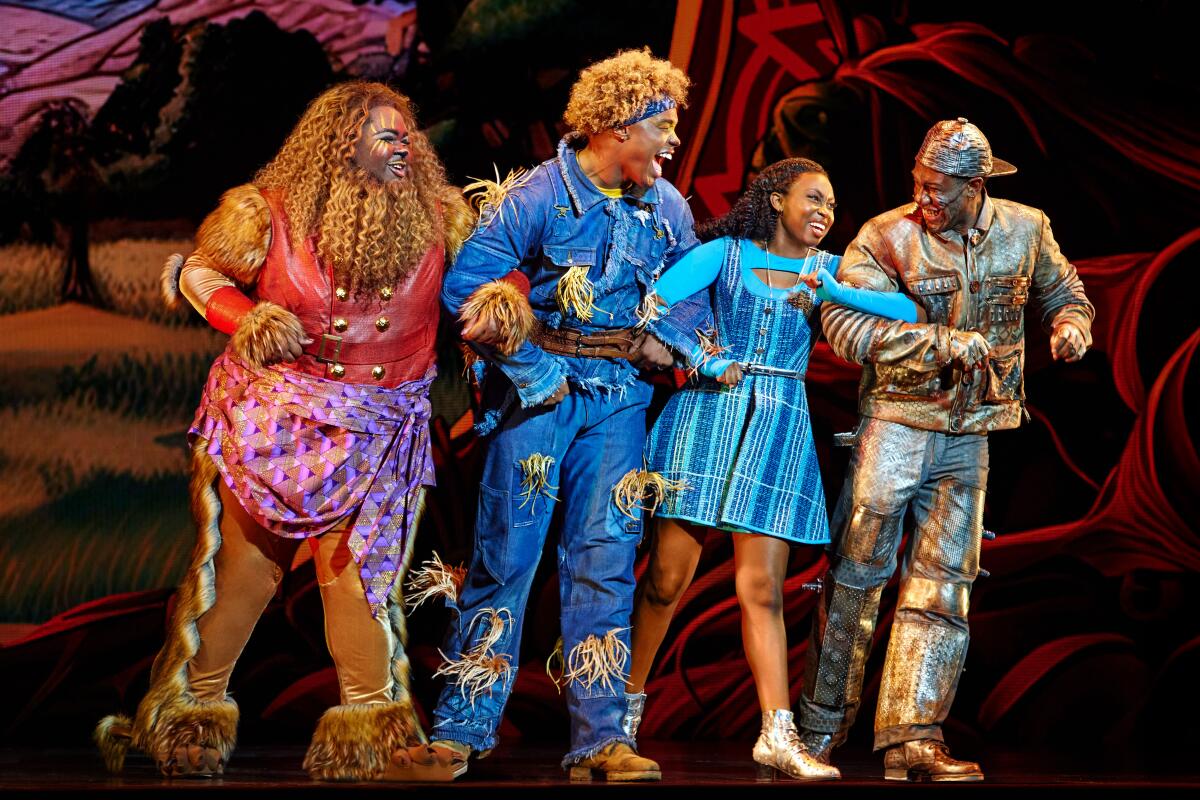
Richardson’s Tinman, who gets his turn to bring the house down, is an unfailing gentleman to Dorothy. But there’s a smart-aleck side to him and every now and again a glimpse of a player — qualities that remove any theatrical rust that the Tinman’s oil can wasn’t able to relieve.
Musicals have come to follow a Broadway run with a national tour. ‘The Wiz,’ starting Tuesday at the Pantages, is doing the opposite — and the strategy is paying off.
Freeman makes the most of the Lion’s scene-stealing silliness, reveling in the skittish big cat’s foppish hamminess. Nothing is explicit, but this newfound community seems to shine with an LGBTQ+ inclusiveness when the Lion struts his campy stuff — one of the few ways that the zeitgeist seems to have shifted from the 1970s. (The sociopolitical texture of this production is otherwise oddly blank.)
R&B recording star Deborah Cox treats her two big numbers as gaudy Glinda, the Good Witch of the South, as though they were concert turns. Allyson Kaye Daniel has enlivening comic moments as Addaperle, playing the Good Witch of the North as a community auntie who always knows what’s what.
As the Wiz, Wayne Brady doesn’t arrive until the second act. His entrance earns the Vegas extravaganza buildup, but I wish he could have doubled as a witch. I’ll savor his dance moves as the Wiz leaves Dorothy and her friends in the lurch, but the revival could use more of his example. He’s big but not so big that he threatens to topple the show.
Director Schele Williams makes good on her commitment, as spelled out in her bio, of “cultivating work with authentic representation,” but her staging seems to be overruled by marketplace considerations. The production leaves an overall impression of having been produced rather than directed.
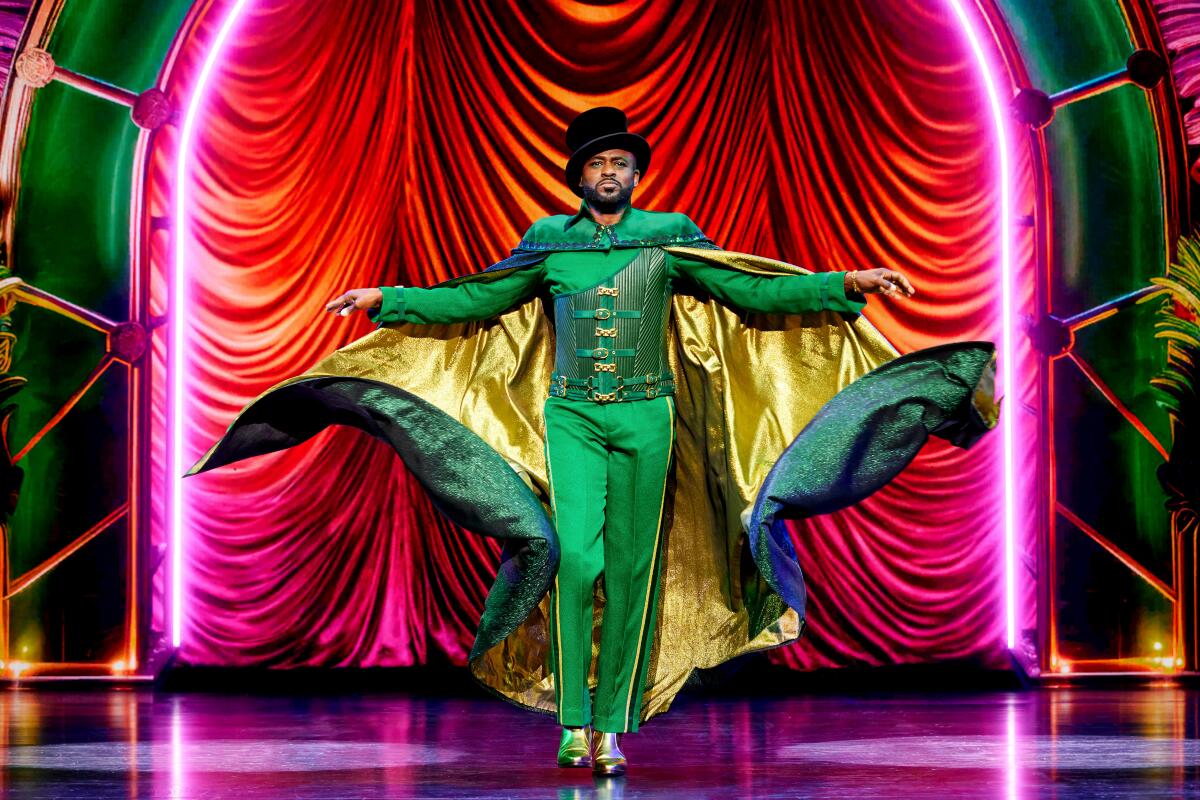
“The Wiz” is treated as a commodity, its challenges draped over with comic window-dressing and “American Idol”-style grandstanding. There’s a slimmer version of “The Wiz” waiting to be sculpted into form by an auteur not afraid to rid the work of its clunky excesses.
Brown’s book, the show’s Achilles’ heel, has been tweaked but not healed. New material has been added by Amber Ruffin, who co-wrote the musical “Some Like It Hot,” to update the humor for a new generation. But the storytelling seems by turns belabored and blurry. The situations that arise rely on knowledge of the original tale to make sense. And the period reflects a politically timid nowhere.
It’s still the music that allows the show to ease on down the road. The glory of Smalls’ R&B score is on rousing display, rescuing the revival from slow patches and building excitement for the next big number.
Seismologists in the region must have been alarmed by the quaking activity that occurred at Wednesday’s opening when Betts heaved all her might into Evillene’s “Don’t Nobody Bring Me No Bad News.” Her performance was so all-out that I feared either her voice or the amplification system would blow out. But she demonstrated anew the meaning of “showstopper.”
Every time Dorothy and her comrades reprised “Ease on Down the Road,” the woman next to me couldn’t resist joining them with some impromptu hand jive. It was a reminder to me that “The Wiz” ultimately belongs to its ardent fans.
As a fan of the score myself, I waited expectantly for Dorothy’s final number, “Home.” Lewis didn’t disappoint. If the power of her singing sometimes drowned out the lyrics, the meaning of the song came through: After discovering her hidden strength, Dorothy has safely returned to where she belongs.
More to Read
The biggest entertainment stories
Get our big stories about Hollywood, film, television, music, arts, culture and more right in your inbox as soon as they publish.
You may occasionally receive promotional content from the Los Angeles Times.
